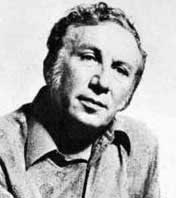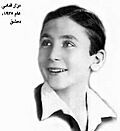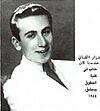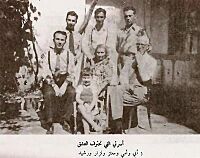Nizar Qabbani facts for kids
Quick facts for kids
Nizar Qabbani
|
|
|---|---|
 |
|
| Native name |
نزار توفيق قباني
|
| Born | 21 March 1923 Damascus, Syrian Federation |
| Died | 30 April 1998 (aged 75) London, England |
| Occupation | Diplomat, poet, writer, publisher، lawyer, intellectual |
| Nationality | Syrian |
Nizar Tawfiq Qabbani (born March 21, 1923 – died April 30, 1998) was a famous Syrian diplomat, poet, writer, and publisher. He is often called Syria's National Poet. His poems are known for being simple yet elegant. They often talk about love, religion, and how Arab people can become stronger against outside control and unfair leaders. Qabbani is one of the most respected modern poets in the Arab world.
Contents
Biography
His Early Life
Nizar Qabbani was born in Damascus, the capital city of Syria. His family was middle-class and worked in trade. He grew up in an old part of Damascus called Mi'thnah Al-Shahm. He went to the National Scientific College School in Damascus from 1930 to 1941.
Later, he studied law at Damascus University and finished his degree in 1945. While he was still a student, he wrote his first collection of poems. It was called The Brunette Told Me and came out in 1942. These poems were about love and a woman's body. This was quite shocking for the time in Damascus.
To make his book more accepted, Qabbani showed it to Munir al-Ajlani. He was the minister of education and a friend of Qabbani's father. Ajlani liked the poems and even wrote the introduction for Nizar's first book.
Diplomatic Career
After finishing law school, Qabbani started working for the Syrian Foreign Ministry. A diplomat is someone who represents their country in other nations. He worked as a consul or cultural helper in many big cities. These included Beirut, Cairo, Istanbul, Madrid, and London.
In 1959, he was appointed to a role in the embassies in China. He wrote many poems during these years, and some of his best works came from his time in China. He continued to work as a diplomat until he left his job in 1966.
Poetic Influences
When Nizar Qabbani was fifteen, his sister passed away. This event had a big impact on him. He once said that love in the Arab world was like a prisoner. He wanted to use his poetry to set free the Arab soul, feelings, and body. He believed that relationships between men and women in his society were not healthy.
In 1981, Nizar Qabbani's wife, Balqees, died in a bombing in Beirut, Lebanon. This happened during the Lebanese civil war. Her death deeply affected Qabbani's feelings and his poetry. He wrote a very emotional poem called Balqees to express his sadness. In this poem, Qabbani blamed all Arab governments for her death. He also used Balqees's death to show the suffering of Arab people in the Levant region.
Here is a small part of his poem Balqees: "Balqees: I ask forgiveness. Maybe your life was for mine, a sacrifice. I know well that your killers’ aims were to kill my words. My beautiful, rest in peace. After you, poetry will cease and womanhood is out of place."
The city of Damascus was a very strong source of inspiration for his poetry. This is clear in his work Jasmine Scent of Damascus. However, Qabbani also showed his love for all Arab people and cities. He saw them as one people, connected by the same struggles and a rich history.
Qabbani spoke out against Western colonial projects in the Middle East. He also often criticized Arab leaders. He said they were corrupt, unfair, and dishonest. One famous example is his poem Sultan: "O Sultan, my master, if my clothes are ripped and torn It is because your dogs with claws are allowed to tear me O Sultan! Because I dare to approach your deaf walls, because I tried to reveal my sadness and tribulation, I was beaten."
Personal Life
Family
Nizar Qabbani had two sisters, Wisal and Haifa, and three brothers, Mu'taz, Rashid, and Sabah. His brother, Sabah Qabbani, became the director of Syrian radio and TV in 1960. He also served as Syria's ambassador to the United States in the 1980s.
Nizar Qabbani's father, Tawfiq Qabbani, was Syrian. His mother was of Turkish descent. His father owned a chocolate factory. He also helped fighters who were resisting the French rule over Syria and Lebanon. Because of his strong views, his father was put in prison many times. This greatly influenced Nizar and helped him become a revolutionary in his own way.
Qabbani's grandfather, Abu Khalil Qabbani, was a very important person in Arab theater. He was one of the first to create new forms of Arab dramatic literature. The Qabbani family originally came from Konya and were of Turkish background. The family name, Qabbani, comes from the word Qabban, which means a Steelyard balance (a type of scale).
Marriages
Nizar Qabbani was married two times. His first wife was his cousin, Zahra Aqbiq. They had a daughter named Hadba and a son named Tawfiq. Sadly, Tawfiq died at the age of 22 from a heart attack while he was in London. Qabbani wrote a famous poem to honor his son, called "To the Legendary Damascene, Prince Tawfiq Qabbani". Zahra Aqbiq passed away in 2007. Their daughter Hadba, born in 1947, lived in London until her death in April 2009.
His second wife was Balqis al-Rawi, an Iraqi schoolteacher. He met her at a poetry reading in Baghdad. She was killed in a bombing at the Iraqi embassy in Beirut on December 15, 1981. This happened during the Lebanese Civil War. Nizar and Balqis had a son, Omar, and a daughter, Zainab. After Balqis died, Qabbani did not marry again.
Later Life and Death
After his wife Balqis died, Qabbani left Beirut. He moved between Geneva and Paris for a while. He eventually settled in London, where he lived for the last 15 years of his life. Even in exile, Qabbani continued to write many poems.
Nizar Qabbani passed away in London on April 30, 1998, at the age of 75. He died from a heart attack. In his will, which he wrote in his hospital bed, Nizar Qabbani said he wanted to be buried in Damascus. People all over the Arab world mourned the great poet. News channels around the world talked about his amazing career as a writer.
Awards and Tributes
- 1992–1993 Al Owais Award for Cultural & Scientific Achievements.
- On March 21, 2016, Google celebrated his 93rd birthday with a Google Doodle.
See also
 In Spanish: Nizar Qabbani para niños
In Spanish: Nizar Qabbani para niños
- List of Arabic-language poets




